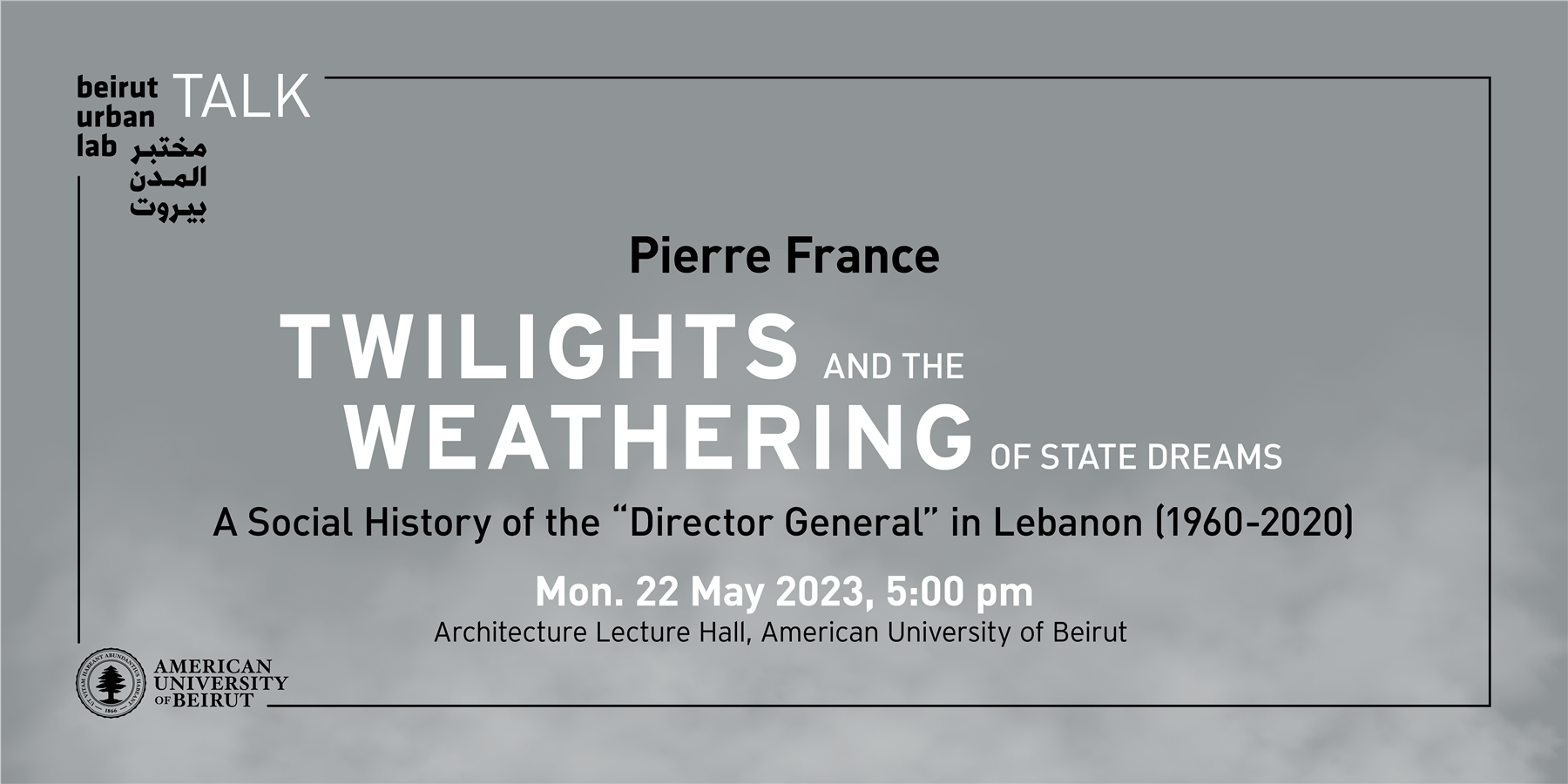Twilights and the Weathering of State Dreams: A Social History of the ‘Director General’ in Lebanon (1960-2020)

×
Join our BUL Talk with Pierre France
Date: Monday May 22, 2023 at 5:00 PM
Location: Architecture Lecture Hall, Dar Al Handasah Design and Architecture Bldg., American University of Beirut
Twilights and the Weathering of State Dreams: A Social History of the ‘Director General’ in Lebanon (1960-2020)
Discussants:
Myriam Catusse, Regional Director of the Institut Français du Proche-Orient (IFPO)
and Wissam El-Lahham, Political Scientist and Lecturer at Saint Joseph University of Beirut
Moderated by:
Mona Fawaz, Professor of Urban Studies and Planning at the American University of Beirut and Research Lead at the Beirut Urban Lab.
×
About the Talk
The Lebanese public sector—or rather the diverse and more or less autonomous administrations referred to as the state, bureaucracy or public sector—is rarely approached from a socio-historical or anthropological point of view. Most of the time, the literature adopts a functional and structural point of view, searching for indicators of corruption instead of conceptualizing it through local variations, historicity, everyday practices and, most of all, individuals. In this presentation, Pierre France will focus on one actor among them, the apparent primus inter pares: the Director General. As shown by the coverage of the recent departure of some historical Directors Generals and the tributes paid to these unlikely “exemplary civil servants,” these individuals have retained power against all odds (at least until recently). In this communication, France will trace the history of these ever-present keepers of the state, and, perhaps even more so, of the possibility of a future state. How has such discourse on exemplary/neutral individuals in a flawed/sectarian system emerged and evolved? What are the underlying sociological and historical dimensions of that system, such as the evolution of their sociological profiles and careers from 1950 to 2020 and their bureaucratic practices?
×
Bios
Pierre France has been a Senior Researcher at the Orient-Institut Beirut since 2020. A PhD candidate (defense in waiting) in Political Science, his doctoral research focused on the process of the Lebanese state maintenance and survival throughout the Lebanese war (1975-1990). Aside of this, he co-authored The Neoliberal Republic with Professor Antoine Vauchez (Science Po, 2017 & Cornell 2021), a contribution to the study of the blurring lines between public and private social spheres in contemporary France. He was also Junior Lecturer in Political Science at Sciences Po Aix (2016-2018) and Core Fellow at the Camargo Foundation (2020).
Myriam Catusse is the Regional Director of the Institut Français du Proche-Orient (IFPO). Her recent research focuses on the comparative analysis of a social issue specific to contemporary neoliberalism, which constitutes the subject of her HDR thesis From Morocco to Lebanon, a new grand transformation. Her work addresses the precarization of social protections not on the margins, but at the heart of public institutions for socialization of risks, by taking the discussion to fields left in the shadow of major comparisons on the welfare state. She is leading a Franco-Lebanese ANR program: PRECARités – Travail, mobilités, propriétés and she contributes to the ANR SUBLIME program. Catusse participates in various learned societies, scientific councils, and ethics committees of institutions, foremost among which is CNRS section 40; collective research and publications, such as the recent Lebanon: A Reflection of the Social Sciences (with C. Raymond and S. Hanafi).
Wissam El-Lahham is a political scientist with a focus on constitutional law and political order, author of a number of research studies addressing the role of religion and constitutionalism, civic values, political reform and monetary history of Lebanon. He holds a PhD in political science and writes frequently on issues related to Lebanese constitutional practices. Lahham is also a Senior Researcher for the “Legal Agenda” specialized in constitutional and parliamentary affairs. He teaches "political thought" and "Lebanese political regime" at the Saint Joseph University of Beirut, Political Science Institute.
Mona Fawaz is a Professor of Urban Studies and Planning at the American University of Beirut. She writes about urban history and historiography, social and spatial justice, informality and the law, property and space, as well as planning practice, theory, and pedagogy. She researches, teaches, and advocates strategies for more inclusive cities.
Myriam Catusse is the Regional Director of the Institut Français du Proche-Orient (IFPO). Her recent research focuses on the comparative analysis of a social issue specific to contemporary neoliberalism, which constitutes the subject of her HDR thesis From Morocco to Lebanon, a new grand transformation. Her work addresses the precarization of social protections not on the margins, but at the heart of public institutions for socialization of risks, by taking the discussion to fields left in the shadow of major comparisons on the welfare state. She is leading a Franco-Lebanese ANR program: PRECARités – Travail, mobilités, propriétés and she contributes to the ANR SUBLIME program. Catusse participates in various learned societies, scientific councils, and ethics committees of institutions, foremost among which is CNRS section 40; collective research and publications, such as the recent Lebanon: A Reflection of the Social Sciences (with C. Raymond and S. Hanafi).
Wissam El-Lahham is a political scientist with a focus on constitutional law and political order, author of a number of research studies addressing the role of religion and constitutionalism, civic values, political reform and monetary history of Lebanon. He holds a PhD in political science and writes frequently on issues related to Lebanese constitutional practices. Lahham is also a Senior Researcher for the “Legal Agenda” specialized in constitutional and parliamentary affairs. He teaches "political thought" and "Lebanese political regime" at the Saint Joseph University of Beirut, Political Science Institute.
Mona Fawaz is a Professor of Urban Studies and Planning at the American University of Beirut. She writes about urban history and historiography, social and spatial justice, informality and the law, property and space, as well as planning practice, theory, and pedagogy. She researches, teaches, and advocates strategies for more inclusive cities.